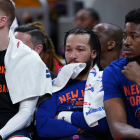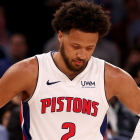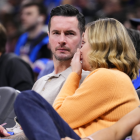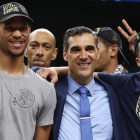By just about any measure -- with the exception of perhaps the measure of its fans -- the Minnesota Timberwolves' season has been by all accounts a success.
This season, the Wolves won 47 games and made the playoffs. Here are Minnesota's win totals for the past 13 seasons -- since 2003-04 -- the last time it made the playoffs: 44, 33, 32, 22, 24, 15, 17, 26, 31, 40, 16, 29, 31.
In 2017-18, the Wolves won more games than any of the past 13 seasons. They did this despite missing their best player (or at least the player who is this team's soul) for 17 games in February and March -- a time period in which they went only 11-9 and from a decent playoff seed to a team that needed overtime in game No. 82 to make the playoffs.
The Wolves' 22-year-old franchise cornerstone, Karl-Anthony Towns, became a first-time All-Star as well as analytics star; his win share total of 14.0 ranked second in the NBA, behind James Harden but ahead of LeBron James.
For a while, until just a few weeks ago, the Wolves were in contention for a home playoff series in a loaded Western Conference.
So why does this Wolves season -- which is quite clearly an unmitigated success in a city that hasn't sniffed the playoffs in a decade and a half -- feel like such a disappointment?
May I point you to the words of TNT commentator and Hall of Famer Reggie Miller, as the clock wound down on a 102-82 Houston Rockets Game 2 blowout of the Wolves on Wednesday night, which put the Rockets up 2-0 in a series that feels like it's headed toward a sweep, or something close to it:
"This has the feel of an exhibition game, other than that first quarter."
It was true. By the time the fourth quarter came around, the Rockets were on cruise control, stretching the lead to as much as 27 points against a Timberwolves team that was either too young, too short on talent, too out-coached, or all of the above. Chris Paul was straight clowning and inspiring poetry from Kevin Harlan:
"It hit the rafters and dropped!"
— NBA (@NBA) April 19, 2018
Chris Paul has a game-high 20 PTS and 6 AST.#Rockets pic.twitter.com/W45nn47X1E
Let's call Game 2 exactly what it was for the Timberwolves: an embarrassment.
And the first two games of this series have come to symbolize exactly what the Timberwolves have been all year long: very close to great, but with no clear path to actually get there.
In Game 1, the Timberwolves nearly did it. They nearly went to Houston and stole a game from a team that feels like the current favorite to win the title. They played efficiently (!). They excelled from the bench (!!). They held Trevor Ariza, Chris Paul, Eric Gordon, Gerald Green and P.J. Tucker to a combine 3-for-25 on three-point shooting (!!!). They were winning with six and a half minutes left (!!!!).
But, yeah, the Rockets -- the better-coached team, the team with the more complete roster and the more talented, more experienced superstars -- won. James Harden went nuts, scoring 44 gorgeous points, and the Wolves lost a game they could have won. The end-of-game punching bag was Towns, who scored only eight points. Afterward, head coach Tom Thibodeau called out Towns, saying he needed to be "more active." (He didn't explain why the Timberwolves couldn't seem to feed the ball to one of the most dominant offensive players in the NBA and put him in a position to score.)
So they were down one, after having missed a golden opportunity to steal one on the road.
Then, in Game 2, they came out and flat got dominated. The game plan was clearly to stop Harden, even if that meant triple-teaming him on drives. Amazingly, the Timberwolves accomplished the impossible, holding the soon-to-be-MVP to 12 points on 2-of-18 shooting. But here's the problem with the Rockets: They have options, and creative ways of finding them. So they smoked the Timberwolves anyway. And Towns somehow regressed from Game 1, scoring only five points, the second-fewest of his career.
Look, there's only so much embarrassment that can be had in losing to the Rockets. This is a great team, with one of the greatest offenses we've ever seen. Most NBA teams would be heading back from Houston down 2-0, with at least one (and frequently two) of those wins of the demoralizing variety. It could happen to anybody.
And it could happen to anybody that, after going up 2-0, Rockets head coach Mike D'Antoni would tell reporters, "We haven't played very well so far."
And yet for Timberwolves fans to hear all of this is the most maddening thing.
Because this team could be great. Maybe not should be great … but certainly could be great. With Jimmy Butler in the lineup for 80 games, this could have been the three-seed in the West.
And yet…
- Butler's contract only lasts two more years.
- Towns' progress seems impeded by Thibs' old-school style.
- Andrew Wiggins' massive potential seems like it will never be realized, despite that max contract.
- The head coach ignores plenty of talented players on the bench and overextends starters.
- The salary cap situation, given Wiggins' max deal, doesn't seem particularly friendly for the future.
It's not crazy for a fan to wonder whether this team's window may close not long after it has opened.
I hope I'm wrong. Towns is a generational talent. Butler may have the biggest heart in the NBA; he's a winner. There are some really nice pieces on this team, both young and old.
But you can't help but wonder, as this team heads back to Minneapolis in a 2-0 hole, whether this team's massive ceiling is even close to reachable anymore. It's a sad thought, given the optimism of six months ago.






















